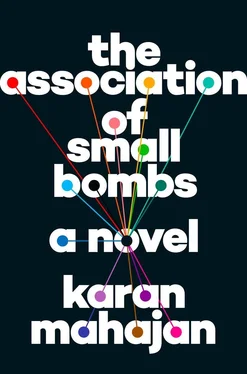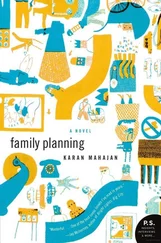________
After his meeting with Abdul, Shockie went to his room. When he came in, Malik was praying on a mat laid out between the two charpais. He was a religious person — religion, Shockie thought, that crutch of the weak.
When he was done praying, Malik sat at the edge of the bed, and Shockie told him about the meeting with Abdul. Malik listened with his hands tight around a copy of Gandhi’s Autobiography , nodding at odd moments.
“You’re listening?” Shockie asked. Why were people never listening to him?
“Yes, yes.”
“Do you want to come?”
“What will I do, bhai? You know how these people treat me.”
“This is an opportunity to change that,” Shockie said. “You’ll get a little practice. Otherwise our missions are too dangerous for a first-timer. But you don’t have to. You can keep letting these people call you a coward.”
“It’s not that I’m afraid,” Malik said. “I think I can be more useful here.” He tipped his head toward a cyclostyle machine and some letter-block printing paraphernalia in the corner of the room. As the “publisher” and “propagandist” he churned out pamphlets, posters, manifestos, and warnings against civilians and army officers to be posted on the walls of village houses and GPOs and thanas, all of them written in an overblown apocalyptic style that Abdul said gave him a headache, and that Shockie, as Malik’s guardian, always edited.
“Suit yourself,” Shockie said.
But he was sad.
That night he stayed up thinking of his mother and imagining a series of girls he had been infatuated with in his village. Where were they now? Was that horrible ox of a weaver really fucking Faiza? (This did not stop him from picturing the act; he liked imagining the private lives of others.) Was Sahar really a mother of two, putting oil on her round stomach? And what about Asma…? In this way, he began to fall asleep. But right when sleep was coming, he got up and said, “You’re lazy.”
Malik, curled on his charpai, his back against the wall, reading, his toes visible and dirty, said, “What?”
“You should come with me. You have no idea how disrespected you are in the group. They mock you openly. When I told Abdul I wanted to bring you, he laughed and forbade me from doing it.”
Malik said nothing.
“When you were talking about Gandhi the other day, they were all laughing. I even tried to signal to you but you were so lost in your conversation. You need to do something. Your position in the group is insecure. If something happens to me, what will you do? That’s why I want you to come with me. That way we can be together if something happens.”
He felt he had made such a good appeal that he was surprised by Malik’s reply. “Maybe you’re the coward.”
Shockie said nothing.
“Inflicting violence is cowardly. We’ve talked about that. If we were brave we’d walk into the street and be martyred.” He pointed to the Autobiography . “You know what Gandhi said Jews should do when faced with the Nazis? Commit mass suicide. Think about that.”
Shockie shook his head. “You’re cracked.”
“So what? What do you think these attacks are going to achieve? Today when you were complaining about the blast not being big enough, I was thinking: It doesn’t matter. It’s all wrong. Blasts are a way of hiding. If you want to be a hero you have to be a martyr.”
“Why don’t you propose this to Abdul?”
“Maybe I will.”
________
After Shockie went to sleep, Malik read by the milky tube light fixed over his bed. He read about Gandhi’s childhood, his suicide attempt with datura seeds, the shame he felt over the fact that he was having sex at the moment his father died, his weak vegetarian constitution, his struggles with pain and sexual urges — he read all this and thought, “But this is me.”
In the morning, when he woke up, Shockie was gone.
________
Shockie took a shared jeep taxi from Kathmandu to Bhairawa, on the border with India. At Bhairawa he boarded a bus to Gorakhpur, where he spent the night again in Das Palace.
Then, after days of traveling by train — this was his real profession, wasn’t it? Traveling? — he came to Hubli.
The Hubli Faction was a small group of Keralite Muslims who planned attacks from a safe house in a forest. They took him to a clearing and wanted to talk about Marxism, revolution, Naxalites, water politics — anything but the issue at hand, which was: arms. Finally they showed him a stash of the most derelict-looking AK-47s Shockie had ever seen and grenades covered in thick dust. Nothing. It was pointless. This was playacting. The country spread around them in the form of a thousand animal sounds: crickets, bats, birds. He thought about what it would mean to die, right now, here — who would remember him? His mother, maybe; possibly Malik — but anyone else? No.
He felt lightheaded in the clearing, in the dry dusk air of the forest, with birds leaping about in the space between trees. A wood fire was going and the members of the Hubli Faction, who got their cues from Rambo, were dressed in black and smoking around this fire.
The next day Shockie took a train back to the Indo-Nepal border. He was in a contrite mood. “I must apologize to Malik,” he thought. He never got the chance.
________
Instead, four days after Shockie left for Hubli, Malik was swept up from his lodgings and arrested.
Malik was brushing his teeth by the open tap when the police came. The four men handcuffed his thin wrists before he could put pants over his underwear.
“What have I done?” he asked.
The police would tell him nothing.
Still, once he was placed in the lockup, he began to relax.
Kashmiris were always being hassled in Nepal for bribes, one oppressed race expressing its particular brotherly cruelty toward another; and besides, the investigator who came to ask him about his recent whereabouts was amiable, distracted.
It was only when Malik caught sight of two bearded Sikh Indian policemen in the crowd of blue Nepali uniforms that he became worried.
The Sikhs were stout and talking fast and Malik put all his fingers in his mouth.
Then the station suddenly emptied and a Nepali policeman keyed open the lockup. “Am I free?” Malik asked.
“In a sense. Very much. Come with me.”
Instead, Malik was led to a windowless police van parked outside in the dirt and shoved into the back. He found himself in a metallic cavern, the outside world visible only through small stripes in the metal, the paint on the inside of the van scratched by desperate inmates.
When the Sikhs got into the front and started the ignition, Malik knew he was being taken to India as a suspect for the bombing.
________
Crouched uncomfortably on the floor of the van, handcuffed, his back against the metallic crown of a tire, Malik watched Nepal disappearing from view, photographing it mentally for what he expected would be years of imprisonment. He had read that the only way to endure solitary confinement — if that was your sentence — was to retreat into your own memories, to open and reread the books stocked in the library of your mind.
He began to cry.
Later, through the openings in the van, through the small grille, Malik saw a clear stream of water — a thread, really; a reel of light and fluid on the earth — and was reminded of his outing with Shockie to the pond two days before. It would be his happiest memory for many years.
Malik was placed in police custody in Delhi on a Sunday. He was tortured for ten days straight.
A month later, he was produced in a Sessions Court in Delhi and united with a group of arrested Kashmiris he didn’t recognize. The men stood like scolded schoolboys before the judge, each with a personal police escort at his side. Malik had feared, after all the torture, that he might find himself facing another co-revolutionary who had broken down and come clean. But this wasn’t the case.
Читать дальше












